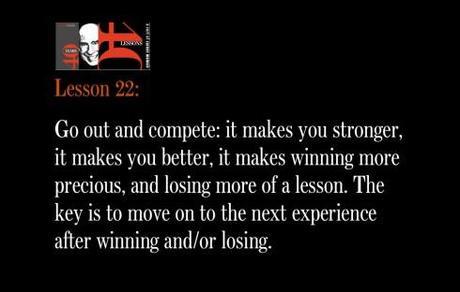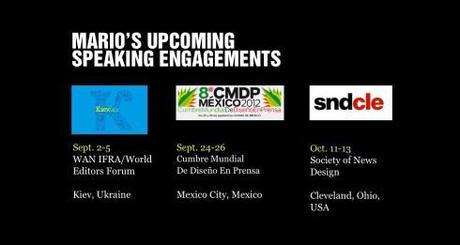TAKEAWAY: This is part 22 of my occasional series 40 Years/40 Lessons, which I call a “sort of career memoir” capturing highlights and reminiscing about what has been a spectacular journey for me, doing what I love most. Today’s segment: all about the importance of competition and the lessons it teaches.

Illustration by Ana Lense Larrauri/The Miami Herald
With the London Summer Olympics dominating so much media time, it is all about competition. It is with interest that we watch the events, excited about the winners, surprised when the expected winners fall short of the mark, and disappointed when our favorites fail to achieve their full glory.
It is a well known phrase around the time the Oscars are giving out that “just by being nominated, you are a winner”. True, but not true, if you believe in the spirit of competition. Ask any nominated actor who did not get the Oscar!
The same can be said for Olympic athletes. It takes a lot of talent, ability, discipline and, of course, luck, to get into an Olympic team representing one’s country.
In that sense, all of the Olympic athletes are winners. However, only three stand at the podium, medals hanging from their necks, smiles beaming with pride. The rest did not make the cut, for whatever reasons or circumstances.
Competition took care of deciding who had the goods and who didn’t at this particular event on this particular day.
Just as it always is in both Olympic and life competitions.
The real world includes real competition
But, how much do we value competition in our everyday lives?
Is the tide turning, and are we beginning to see competition as some kind of evil to be avoided for the sake of making everyone feel good?
More and more, we read and hear stories about schools where the idea of competition—-in its old world definition—-is no longer something to pursue with gusto. Some belief that every child should enjoy a measure of success (we say amen to that), and that modern classrooms should avoid at all costs making the children compete (we say that this does not make sense, if the idea is to provide each child with a complete education).
Even Tyler Brule, who loves everything Japan, writes this weekend in the Financial Times that he can’t understand why Japanese schools are abandoning the spirit of competition.
“If you think this sounds absurd, we might want to visit some playgrounds and sporting arenas around the world to see what children are being taught about fair play and crossing the finishing line. A friend in Tokyo recently told me how the curriculum had changed for exercise hour and that games that involved having to go faster and higher, and that pitted toddler against toddler, had now been struck off the list. No sack races, no 100m dashes, no swimming competitions and no high jumping. While I stood there slack-jawed listening to this nonsense, my friend went on to explain that it was now “all about being the best you can be and not worrying about competing with those around you. It was about crossing the finish line as a team and not as an individual.”
I agree totally with Tyler here, especially when he writes that “ …..removing competition takes all the fun out of childhood and is simply wrong.”
Not just out of childhood, Tyler, but out of every stage of life, too.
Compete with gusto, learn to lose with style
My own take on competition is simple: I grew up in the United States, and with that comes an inherent desire to be competitive, to be the best you can be, to compete in a fair way, then rejoice if you win, retreat if you lose, analyze why you lost, and prepare to continue competing.
Of course, I have faced competition from as long as I remember, and still do. As a child actor in Cuba, I remember auditioning for parts, some of which I got, some of which I didn’t. Today, my team and I at Garcia Media continue to pitch our services for specific projects worldwide. The competition continues.
I am not obsessed by competition, but I take it seriously. I am happy to say that many of the people in this industry with whom I compete from day to day I have the highest respect for, some are even close friends. We all view the frequent projects in which we compete as a necessary part of working professionally in this field.
When we see each other, we seldom sit down to discuss who won or who lost what project. Instead, we concentrate on what we are doing, what we are learning and life in general.
Does losing a project hurt? Yes, of course, some more than others. It is a momentary bee sting that hurts and goes away.
In each case, I tell my team that we give ourselves 24 hours to do the crying, the wake and the burial, and on the 25th hour we review what may have gone wrong and put all that energy into the next pitch, or the project in which we are working.
Teaching about competition
Recently, when one of my granddaughters failed to make the soccer team, she was disappointed, but not angry. I sat with her, pulled out the iPad and started my conversation about winning and losing while she did what she does so well: drawing.
I told her that life is about winning but also losing, that those two components are part of growing up and staying balanced throughout one’s journey.
She understood, as she painted a beautiful bouquet of flowers on the iPad, using the Paper 53 app.
At the end, I said: This is beautiful, here you are a winner!
We are all winners at something, but we also become better persons having experienced the disappointment of losing.
I am all for creating competing environments, that is what life is about. The classroom should not shelter us from the experience of losing. It is part of our education as individuals on a journey that nobody completes without the experiencing of losing, and that is a fact.
At 65, I still experience the exhilaration of winning and the disappointment of losing. More often than not, we at Garcia Media—-like design consulting firms everywhere—-must pitch our talents and services for every project. Sometimes we win, sometimes we don’t.
Does that make us feel like less? Of course, not. If we lose, I remind the team that somebody prepared better, or fulfilled the needs of the client in better ways. We emphasize the positive, learn from the experience and move on.
“Move on,” two great English words that make all the difference. Fewer of us would ever be in professional therapy if we learned the simple exercise of moving on.
Competition is good.
It makes winning more exhilarating.
It makes us improve what we do at every step, knowing that it the best who wins.
It makes the reward all that more meaningful.
At the Olympics, it is gold, bronze and silver. Each represents a different level of talent and skill. It is the same in life. We collect medals along the way, but also collect moments of defeat. Both are valuable, in different ways.
I can honestly say that I am a better person having experienced both victory and defeat.
It is still a reason to wake up excited each day,
See our related 40 Years/40 Lessons segment: The Pitch
http://www.garciamedia.com/blog/articles/40_years_40_lessons_14_the_pitch


1.Mirrors.
http://www.garciamedia.com/blog/articles/40_years_40_lessons_1—a_look_in_the_mirror
2.Refugee.
http://www.garciamedia.com/blog/articles/40_years_40_lessons_2—refugee
3.Teacher.
http://www.garciamedia.com/blog/articles/40_years_40_lessons_3—teacher/
4.Mentors.
http://www.garciamedia.com/blog/articles/40_years_40_lessons_4—mentors/
5.Consultant.
http://garciamedia.com/blog/articles/40_years_40_lessons_5—consultant/
6.Eagle.
http://garciamedia.com/blog/articles/40_years_40_lessons_6eagke
7.Abroad.
http://garciamedia.com/blog/articles/40_years_40_lessons_7._abroad
8. Books
http://garciamedia.com/blog/articles/40_years_40_lessons_8_books
9. Luck
http://garciamedia.com/blog/articles/40years_40_lessons_9_luck
10. Positive.
http://garciamedia.com/blog/articles/40_years_40_lessons_10positive
11. Culture
http://garciamedia.com/blog/articles/40_years_40_lessons_11_culture
12.Adapting.
http://garciamedia.com/blog/articles/40_years_40_lessons_12_adapting1
13.Dreams.
http://www.garciamedia.com/blog/articles/40_years_40_lessons_13_dreams
14. The Pitch.
http://www.garciamedia.com/blog/articles/40_years_40_lessons_14_the_pitch
15.. Ethics.
http://garciamedia.com/blog/articles/40_years_40_lessons_15_ethics/
16. Time.
http://garciamedia.com/blog/articles/40_years_40_lessons_16_time
17.Pause.
http://garciamedia.com/blog/articles/40_years_40_lessons_17_pause/
18.Stories.
http://www.garciamedia.com/blog/articles/40_years_40_lessons_18_stories
19.Boss.
http://garciamedia.com/blog/articles/40_years_40_lessons_19_boss
20.Bubblies.
http://garciamedia.com/blog/articles/40_years_40_lessons_21_bubblies/
21.Age.
http://garciamedia.com/blog/articles/40_years_40_lessons_21_age/
Mario Garcia’s upcoming speaking engagements:

WAN-IFRA World Editors Forum, Kiev, Ukraine, Sept. 2-5
http://www.wan-ifra.org/events/64th-world-newspaper-congress-19th-world-editors-forum
Cumbre Mundial de Diseño en Prensa 2012: Mexico City; September 24-26
http://www.cmdprensa.com/mx2012/
SND (Society of News Design) Cleveland; Oct. 11-13

